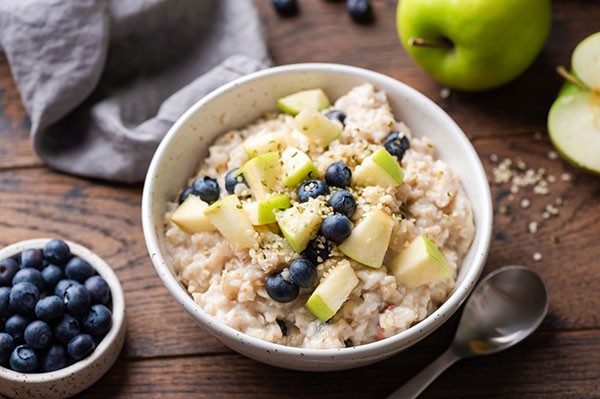Gastroesophageal reflux disease (GERD), commonly known as acid reflux, is a condition where stomach acid frequently flows back into the esophagus, the tube connecting your mouth and stomach. This can irritate the lining of your esophagus, causing heartburn, regurgitation, and other uncomfortable symptoms. While lifestyle modifications play a crucial role in managing GERD, understanding What Foods Cause Acid Reflux Disease is paramount in alleviating and preventing its symptoms.
Common Food Triggers for Acid Reflux
While individual sensitivities vary, certain foods are known to commonly trigger acid reflux. Eliminating or reducing these foods from your diet may significantly improve your GERD symptoms.
- High-Fat Foods: Fatty and fried foods, such as burgers, fries, and pizza, can worsen acid reflux. They take longer to digest, increasing the time stomach acid can leak into the esophagus.
Alt text: Delicious, but potentially problematic, a burger and fries meal can be a trigger for acid reflux due to the high fat content.
-
Spicy Foods: Spicy dishes containing chili peppers, hot sauce, and other spices can irritate the esophagus and increase acid production, leading to heartburn.
-
Citrus Fruits and Juices: While generally healthy, citrus fruits like oranges, grapefruits, lemons, and limes are high in acidity, potentially irritating the esophagus. Tomato-based products, including tomato sauce, ketchup, and salsa, can also have a similar effect.
-
Chocolate: This beloved treat contains methylxanthines, which can relax the lower esophageal sphincter (LES), allowing stomach acid to flow back into the esophagus.
-
Caffeine: Coffee, tea, and caffeinated sodas can also relax the LES, increasing the risk of acid reflux.
-
Onions and Garlic: These pungent vegetables can trigger heartburn in some individuals with GERD.
-
Peppermint: While often used to soothe digestion, peppermint can relax the LES, exacerbating acid reflux.
-
Carbonated Beverages: The bubbles in carbonated drinks can increase pressure in the stomach, forcing acid into the esophagus.
-
Alcohol: Alcohol, especially in excess, can relax the LES and irritate the esophagus, leading to heartburn and other GERD symptoms.
Foods Less Likely to Trigger Acid Reflux
While avoiding trigger foods is crucial, incorporating foods that are less likely to cause acid reflux can contribute to a more comfortable and symptom-free life.
-
Non-Citrus Fruits: Opt for fruits like bananas, melons, apples, and pears, which are lower in acidity and less likely to irritate the esophagus.
-
Vegetables: Most vegetables are generally safe for GERD sufferers. Steaming or roasting vegetables is preferable to frying them. Remember that while raw tomatoes might be fine, tomato sauce may be an issue.
Alt text: Colorful and fresh raw vegetables offer a healthy, low-acid option for those managing acid reflux.
-
Lean Meats and Poultry: Grilled, baked, or broiled lean meats and poultry are excellent protein sources that are less likely to trigger acid reflux. Avoid frying or adding excessive amounts of fat.
-
Oatmeal and Whole Grains: These are excellent sources of fiber and complex carbohydrates. They are soothing and less likely to cause reflux. Whole-grain bread, rice, and couscous are also good choices.
 photo of a bowl of oatmeal with blueberries and chunks of green apple; a small bowl of berries and an apple cut in half are next to the bowl
photo of a bowl of oatmeal with blueberries and chunks of green apple; a small bowl of berries and an apple cut in half are next to the bowl
Alt text: A comforting bowl of oatmeal with blueberries and green apple chunks, a GERD-friendly breakfast option.
- Healthy Fats: Incorporate unsaturated fats from sources like olive oil, avocados, nuts, seeds, and fatty fish like salmon and trout. These fats are generally well-tolerated and offer numerous health benefits.
Eating Habits to Reduce Acid Reflux
Beyond specific food choices, adopting healthier eating habits can significantly reduce acid reflux symptoms.
-
Eat Smaller, More Frequent Meals: Large meals can put pressure on the stomach, increasing the likelihood of acid reflux. Smaller, more frequent meals are easier to digest and less likely to trigger symptoms.
-
Avoid Lying Down After Eating: Gravity helps keep acid in the stomach. Avoid lying down for at least three hours after eating to prevent acid reflux.
-
Avoid Eating Before Bed: Refrain from eating for at least three to four hours before bedtime. Late-night meals or snacks increase the risk of nocturnal acid reflux.
-
Avoid Vigorous Exercise After Eating: Strenuous activity after eating can force stomach acid into the esophagus. Wait a couple of hours after eating before engaging in vigorous exercise.
The Importance of Identifying Personal Triggers
It’s essential to remember that individual food sensitivities vary. Keeping a food diary to track what you eat and how it affects your symptoms can help you identify your specific trigger foods. Experiment by eliminating suspected triggers one at a time to see if your symptoms improve. Then you can try adding them back one by one.
Conclusion
Managing acid reflux disease often involves dietary modifications. By understanding what foods cause acid reflux disease and adopting healthier eating habits, individuals can effectively control their symptoms and improve their quality of life. While some trial and error may be necessary to identify personal trigger foods, the effort is well worth the improved comfort and well-being. If symptoms persist despite dietary changes, consult with a healthcare professional for further evaluation and management options.